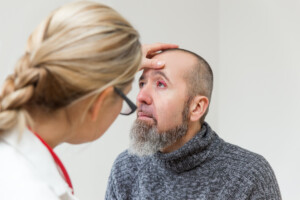The skin around your eyes has suddenly become dry and flaky, and itches. What might this be?
Dry, flaky and itching eyes not only feel bad, but they don’t look too good, either.
Has this happened to you lately?
“This is likely allergic contact dermatitis,” says Gary Goldenberg, MD, of Goldenberg Dermatology, and assistant professor of dermatology and pathology at Mount Sinai School of Medicine.
“This condition is more common in women than men around the eyes, continues Dr. Goldenberg.
“The most common causes are nail polish, cosmetic products, hair care products and gold jewelry.
“This condition is likely to come and go unless you find out what’s causing the problem and eliminate its contact with the skin.”
Sources of Contact Dermatitis
The skin around the eyes is particularly sensitive and not immune to reactions from allergic substances.
Allergic reactions in this area can manifest as dryness, itchiness, and flaking, but may also include redness, bumps, and blisters.
Such symptoms can occur if allergens come into contact with the delicate skin around your eyes.
A common way allergens can transfer to this sensitive area is through direct contact with contaminated hands.
For instance, if you apply antibiotic creams or other topical medications and do not wash your hands thoroughly afterward, residues of these substances can linger on your fingertips.
When you then touch your face or rest your cheek in your palm, these allergens are transferred to the skin around your eyes, potentially triggering an allergic reaction.
Similarly, substances like sawdust, which is known to cause contact dermatitis, can also be a culprit if you are exposed to it regularly.
Other potential irritants include various chemicals such as solvents, insect repellents, rubbing alcohol, bleach, and detergents.
Even perfumes and the rubber used in goggles can contribute to contact dermatitis around the eyes.
To prevent these issues, it’s important to practice good hygiene, such as washing your hands after applying topical products and avoiding direct contact with known allergens.
If symptoms persist, consulting a healthcare professional can help identify the specific allergen and provide appropriate treatment or preventive measures.
Solutions
Gloves act as a barrier, preventing direct contact with harmful substances like solvents, detergents and other chemicals that can cause dermatitis or other skin issues.
Using gloves can also help prevent the transfer of these chemicals to your face, particularly if you inadvertently touch your eyes or other sensitive areas.
Dr. Goldenberg explains, “Treatment involves moisturizers, such as aquaphor, topical steroid cream and non-steroidal creams, like elidel and protopic. Most importantly see your dermatologist, find out the cause and avoid it.”

Dr. Goldenberg of Goldenberg Dermatology provides comprehensive care in medical and cosmetic dermatology, including melanoma and other skin cancer, moles, psoriasis, eczema and acne. He is the medical director of the Dermatology Faculty Practice, NY.
 Lorra Garrick has been covering medical, fitness and cybersecurity topics for many years, having written thousands of articles for print magazines and websites, including as a ghostwriter. She’s also a former ACE-certified personal trainer.
Lorra Garrick has been covering medical, fitness and cybersecurity topics for many years, having written thousands of articles for print magazines and websites, including as a ghostwriter. She’s also a former ACE-certified personal trainer.
.










































